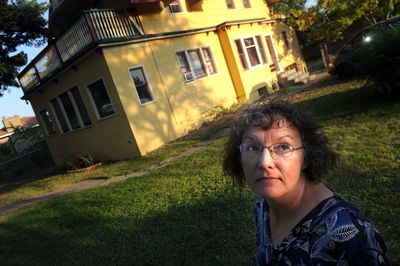Avista ratepayers to get their say
Utility seeking gas, electric rate increases

Heating bills sap Karen Fournier’s budget.
The single mother is volunteer executive director of Hearth Homes, a nonprofit shelter for homeless women and children that operates out of a 1907 Victorian house in Spokane. The roomy, two-story structure has space for three families. But in the winter, the monthly bill from Avista Utilities – which Fournier frequently pays out of her own pocket – can hit $350.
“Two years ago I blew insulation into the attic,” Fournier said. The house also has a new gas furnace with a programmable thermostat and heavy curtains to keep out drafts. “The utilities are still the single biggest expense,” she said.
Fournier recently wrote to the Washington Utilities and Transportation Commission, urging the commission to carefully scrutinize Avista’s request for higher electric and gas rates.
“It seems like the upper echelon needs to have more empathy for the lower classes – the people who are struggling to make it from day to day,” she said.
Avista is asking for increases of 9.1 percent in electric rates for its Eastern Washington customers and a 2.4 percent in natural gas rates. If they are approved, a typical household would pay an additional $6.53 per month for electricity and $2.84 more per month for natural gas.
On Thursday, customers will get a chance to sound off at two public meetings sponsored by the utilities commission.
According to spokeswoman Marilyn Meehan, the commission must weigh the competing needs of reasonable rates for customers against the utility’s ability to earn a fair profit. More than 100 customers have sent comments to the commission, including one elderly woman who said she kept her thermostat so low last winter her houseplants died. Nearly all the people who wrote asked the commission to reject Avista’s request.
Avista officials say the company isn’t being greedy. They said the rate hike would generate $37 million the utility needs for capital improvements and other expenses.
“Customers get the impression that our company is very healthy and making lots of money,” said Kelly Norwood, an Avista vice president. “When you step back and look at us from a bigger picture perspective, we’re on the lower end of financial health for investor-owned utilities across the county.”
The company’s low bond ratings reflect that, he said. The ratings mean the company pays more to borrow money – a cost that’s passed on to Avista’s customers, Norwood said.
The company also is working to increase shareholders’ dividends so they’re more competitive with dividends paid out by other utilities.
If Avista isn’t an attractive investment, Norwood said, people won’t want to buy the company’s stock, which is one way that Avista finances projects. Last year shareholders earned a rate of return of 5.2 cents on each dollar, he said.
“We have to earn some kind of return for shareholders,” he said. “They have lots of other places they could put their money.”
On Tuesday, Avista also announced it would not include $21 million in costs related to the Spokane River dams relicensing effort in the current rate request. Those costs will be deferred.
The deferral was part of a settlement that resulted in a slight lowering in Avista’s initial rate request, which was filed in March. The utilities commission staff has signed off on the settlement. However, the Washington Attorney General’s Office, which represents ratepayers, has not.
By February, the three-member utilities commission must make a decision on Avista’s request, Meehan said.
In addition to serving as executive director of Hearth Homes, Fournier works full-time for a commercial insurance firm. She read Avista’s filing carefully.
Fournier said she was disturbed to see that the request included $5 million for higher rates of return for shareholders. “I don’t think they need a higher return,” she said. “They’re not the ones having trouble paying their heating bills.”
Meanwhile, Fournier – who donates up to half of her income to Hearth Homes – has taken action. She recently bought another home to house the nonprofit she started in 2003.
It’s newer and more energy efficient than the Victorian, she said.